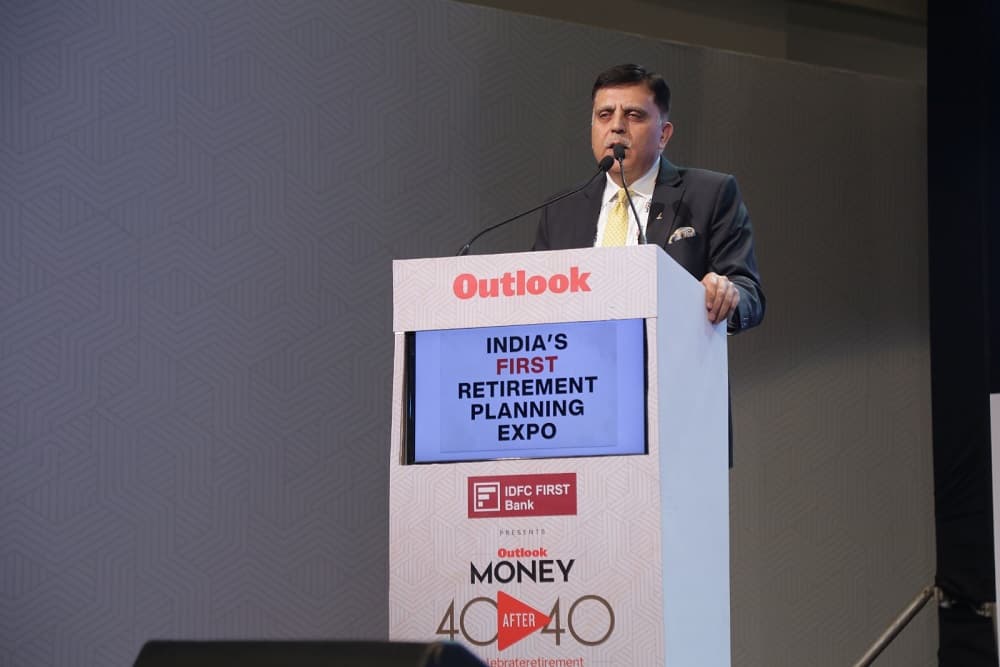40After40 Expo: Lot Needs To Be Done To Make Senior Care Ecosystem Robust, Says Rajit Mehta, MD, Max India
India’s traditional healthcare system is all focused on episodic emergency care rather than holistic wellness, says Mehta.
India’s traditional healthcare system is all focused on episodic emergency care rather than holistic wellness, says Mehta.

40After40 Expo Rajit Mehta
Advertisement
Rajit Mehta, managing director of Max India Ltd, who was one of the speakers at Outlook Money’s 40After40 Retirement Expo in Mumbai from January 23 to 24, has highlighted the pressing issues facing senior care in India. Referring to his own experience of caring for his parents, Mehta said he has seen them transition from active retired living to a passive retired life and now to almost a recluse contained in the house’s four walls, underlining how India’s care ecosystem for seniors has been a struggle.
Mehta said that India’s traditional healthcare system is all focused on episodic emergency care rather than holistic wellness, leaving a wide gap between needs and delivery.
Advertisement
Also Read: 40After40 Expo: Know Why You Don’t Save For Retirement To Help You Get Started, Says Sashi Krishnan
“If you look at insurance or health policies for seniors after a certain age, there is none. The reverse mortgage product never took off in India, and we are woefully short of healthcare workers,” Mehta stressed, pointing at the challenges of a growing senior population in India, where in the next few decades, he said, one in every five Indians will be a senior citizen.
Advertisement
Time To Rethink And Rewire
Although the event focused on retirement planning, his speech mainly focused on healthcare. He asked the audience if “Wealth is the real wealth or health is the real wealth?”
Mehta stressed relooking at policies, frameworks, structures, mindsets, and social preparedness to handle problems faced by seniors. He delved into areas like what happens with age, what changes, and how people’s attitudes have changed or needs evolved post-Covid.
Also Read: Retirement Expo 40After40: I Am Bihari And I Am ‘Ziddi’, Says Manoj Bajpeyee
He spoke on a care ecosystem that can ensure seniors live with respect and dignity and Indian and global trends around senior healthcare with examples of how his team has integrated systems at Max India and Antara Senior Living into creating an ecosystem for healthy living. He also highlighted the physical, emotional, and mental changes with age. “You can no longer climb that flight of stairs quickly, you cannot attend the wedding in the neighbourhood you wanted to, you cannot relish that hot ‘Gulab Jamun’,” he said, highlighting their difficulties.
Emotionally, too, they feel isolated. “Your kids get busy with their lives; you yearn for some time with them; the good old system in India of joint family of the community, comradery has broken down in the cities, and it is quite obvious that you face loneliness, anxiety and depression—the fact of what happens as people age. So, a lot needs to be addressed,” he said.
Also Read: The Secret Recipe To Invest In A Bull Market
He also drew attention to a survey done every two years by his organisation on the state of seniors. He highlighted some interesting facts from the survey post-Covid. It found that a lot more seniors were dependent on children financially than before. A lot more were living alone by themselves, and one in 10 seniors faced abuse, a sad reality. Mehta said “There are already 120 million senior citizens in India today, and it supposedly needs at least one and a half person to care for a senior. Now, where would these 18 to 20 crore caregivers come from? So, a lot of issues are left to be addressed.”
What Do Seniors Really Need?
It is not rocket science to understand what their needs are—proper diet, sleep, some physical activity and social connectedness, some medication, and safety—that’s all they need. More importantly, he said, that “What hurts is the loss of relevance, identity and purpose. They were decision makers in their families only a few years ago, now nobody listens to them, they were the center of activity and attraction, now they are just being told what the family is doing. So that’s what we need to really take care of,” Mehta stressed.
In addition to the traditional healthcare system focused on emergency or episodic care, “We need to integrate ayurveda, naturopathy, meditation, yoga, acupuncture, etc., because you need holistic wellness, and preventive long-term care. The entire thing needs to come together,” he said.
Also Read: Retirement Expo 40After40: Key Insights For Financial Wellness
Modern medicines can only treat symptoms, emergencies or episodes, and seniors, he said, need emotional resilience and good nutrition, too, as they age. For instance, sodium levels, Vitamin B12s, vitamin D, etc., can cause a havoc in the system if the diet is not planned carefully.
How The Senior Care Technology Is Evolving
He said that a lot is happening on the technology front these days that can perhaps solve and unlock the potential and ensure seniors live safely. For instance, he said intelligent pill dispensers, ARVR systems to treat mental disorders, robots to care for loneliness, software to detect and prevent falls, and other innovations from remote monitoring sensors and cameras to wearables could make a difference.
Advertisement
A standard health insurance policy covers diabetes, but is it sufficient? Should you buy a diabetes-focused policy?
The scheme prioritises the well-being of sick or physically challenged citizens by offering comprehensive medical care and nursing assistance within the ashrams
The BJP party had pledged in its poll manifesto to extend the Ayushman Bharat Yojana coverage to seniors aged 70 and above so that more people could participate in the scheme.
Get all the latest stories delivered to your inbox
Advertisement
Get all the latest stories delivered to your inbox